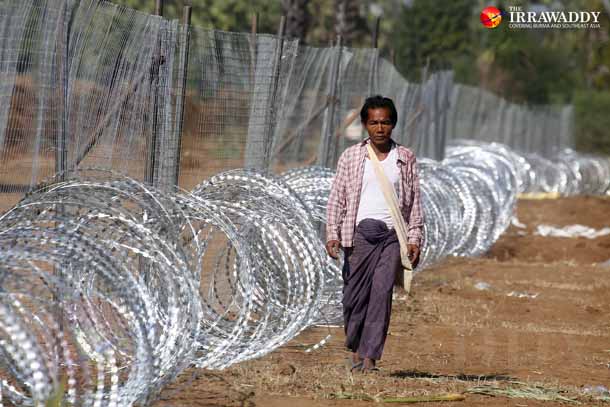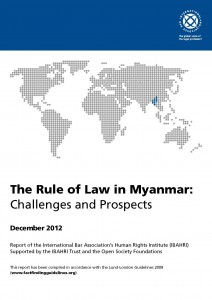Posts Tagged ‘Legal Reform’ (11 found)
Time for the Government to Accept the Reality of Human Rights Problems, Take Effective Measures and Move Forward
Today, Burma/Myanmar’s human rights situation was reviewed by the United Nations Human Rights Council Working Group on the Universal Periodic Review (UPR) in Geneva. The report of the Myanmar Government’s delegation includes details of government activities to fulfill their commitments from the first UPR cycle but fails to take note serious ongoing human rights violations and challenges into account […]
• • •Statement from the Open Government Partnership Awareness Workshop for Civil Society
Over 193 representatives from 80 Civil Society Organizations (CSOs) and networks in Myanmar participated in the Open Government Partnership (OGP) awareness-raising workshop in Yangon from 19-20 January 2015. The objective of this workshop was to raise awareness and understand the potential benefits, opportunities, weaknesses and concerns regarding Myanmar’s participation in the OGP in the context of the recent transition process and the political developments in Myanmar since 2011 […]
• • •Letpadaung Crisis Takes a Turn for the Worse
 As 2014 ended seeing Burma’s reforms backsliding and the peace process stalling, Burma welcomed 2015 with many unresolved issues continuing to face people across the country.
As 2014 ended seeing Burma’s reforms backsliding and the peace process stalling, Burma welcomed 2015 with many unresolved issues continuing to face people across the country.
The ongoing dispute between local villagers and the Burma Government and Wanbao, a Chinese mining company, over land grabs and environmental damage continues to rumble on as police shot dead Daw Khin Win as she was demonstrating against the controversial Letpadaung mining project in Sagaing Region. Meanwhile, the police continue to arrest and detain activists who speak out against such violence on politically motivated charges, underlining the dire need for legal and judicial reform and the complete lack of the rule of law in Burma […]
• • •Myanmar 2014: Civic Knowledge and Values in a Changing Society
 After decades of military rule and isolation, a new Asia Foundation survey shows Myanmar’s citizens are hopeful about the future – on elections, respondents say they believe in exercising their right to vote: 77 percent say that voting can lead to improvements in the future, just 10 percent say things will not change no matter how one votes. But this optimism is tempered by challenges that remain. The findings reveal limited knowledge among the public about government institutions and their functions, low level of social trust, a high degree of political polarization, and deep apprehension about economic opportunities.
After decades of military rule and isolation, a new Asia Foundation survey shows Myanmar’s citizens are hopeful about the future – on elections, respondents say they believe in exercising their right to vote: 77 percent say that voting can lead to improvements in the future, just 10 percent say things will not change no matter how one votes. But this optimism is tempered by challenges that remain. The findings reveal limited knowledge among the public about government institutions and their functions, low level of social trust, a high degree of political polarization, and deep apprehension about economic opportunities.
Not a Rubber Stamp: Myanmar’s Legislature in a Time of Transition
Myanmar’s new legislature, the Union Assembly formed in 2011 on the basis of elections the previous year, has turned out to be far more vibrant and influential than expected. Both its lower and upper houses have a key role in driving the transition process through the enactment and amendment of legislation needed to reform the outdated legal code and are acting as a real check on the power of the executive.
Yet, some bills moving through the legislature have raised concerns that the authorities, both legislative and executive, may not be ready to give up authoritarian controls on the media, on civil society organisations and on the right to demonstrate. More broadly, the role of the 25 per cent military bloc and its impact on the legislature have been questioned. Serious individual and institutional capacity constraints and unclear procedures serve as a brake on effective, efficient lawmaking […]
• • •Not a Rubber Stamp: Myanmar’s Legislature in a Time of Transition
In its latest briefing, Not a Rubber Stamp: Myanmar’s Legislature in a Time of Transition, the International Crisis Group looks at Myanmar’s Union Assembly, formed in 2011 and the first independent such body the country has seen in half a century. Both its lower and upper houses have shown some strengths and are important drivers of the transition process. However, they sometimes struggle to develop technically sound and democratically oriented laws […]
• • •Only One Side of the Story of Reform in Burma
By Khin Ohmar
The statement by Burma’s Minister for Foreign Affairs, Wunna Maung Lwin, on 13 September at the 24th session of the United Nations Human Rights Council, on the country’s recent reforms or “progressive developments,” made for interesting reading. Indeed, it seems to suit many, not least the Burma government, to impose a simplistic narrative on events in the country over the last two years. Yet such a narrative is only one side of the story […]
• • •Myanmar: Public Service Media Needed but Proposed Bill Inadequate
Establishing a genuine public service media is desperately needed in Myanmar to provide an independent, impartial and balanced source of information, and to encourage pluralism. Unfortunately, the proposed bill on public service media would if adopted continue state control of the media and the disenfranchisement of ethnic minorities. ARTICLE 19 urges parliament to make significant changes before adopting it […]
• • •Myanmar: Analysis of Government Press Law
The Centre for Law and Democracy (CLD) and International Media Support (IMS) today released Comments on the draft Printing and Publishing Enterprises Law (draft Law) released by the Ministry of Information of Myanmar in early March 2013. In August 2012, the Ministry tasked the Interim Press Council with preparing a draft Press Law, and the release of the draft Law by the Ministry came as a surprise to many observers. As the Comments make clear, the draft Law fails in important ways to conform to international standards regarding media freedom […]
• • •The Rule of Law in Myanmar: Challenges and Prospects
 Myanmar is on the cusp of major reforms, but it needs to confront and overcome the legacy of its recent past if those reforms are to make progress. In order to understand Myanmar’s prospects and needs at this important juncture and, more specifically, to find out how far it has begun to adhere to globally prevalent understandings of the rule of law, the International Bar Association’s Human Rights Institute (IBAHRI) sent a delegation to the country’s major cities on a fact-finding mission between 11 and 18 August 2012. Its assessment and conclusions are laid out in this report […]
Myanmar is on the cusp of major reforms, but it needs to confront and overcome the legacy of its recent past if those reforms are to make progress. In order to understand Myanmar’s prospects and needs at this important juncture and, more specifically, to find out how far it has begun to adhere to globally prevalent understandings of the rule of law, the International Bar Association’s Human Rights Institute (IBAHRI) sent a delegation to the country’s major cities on a fact-finding mission between 11 and 18 August 2012. Its assessment and conclusions are laid out in this report […]









 All posts
All posts